Health
Exercise When Sick: Expert Advice on Staying Active Safely

When illness strikes, many individuals grapple with the decision of whether to continue their exercise routines. With the onset of cold and flu season, understanding how to approach physical activity while unwell is crucial. To clarify this matter, three medical experts specializing in sports medicine and infectious diseases offered valuable insights regarding exercise during sickness.
Understanding When to Exercise
According to Dr. Jennifer Luz, a board-certified specialist in sports medicine at Boston Orthopaedic and Spine, a general guideline is to maintain your workout routine if symptoms are “above the neck.” This includes conditions such as nasal congestion, a runny nose, or a mild headache. However, more severe symptoms that affect the chest or the body, like fever, body aches, or significant respiratory issues, warrant a break from exercise.
Dr. Sarah Eby, a physician at Mass General Sports Medicine and assistant professor at Harvard Medical School, emphasizes the importance of listening to your body. If you’re experiencing symptoms such as nausea, vomiting, or difficulty breathing, it is advisable to refrain from working out. “Your body is directing its energy towards fighting off a more significant infection,” she explains. Continuing to exercise during this time can prolong recovery.
Potential Benefits and Risks of Exercising While Sick
While regular exercise is beneficial for overall health and can strengthen the immune system, exercising while sick does not necessarily expedite recovery. Dr. Brian Chow, director of the Positive Care Clinic at Harbor-UCLA Medical Center, notes that the effects of exercise on immunity are long-term, not immediate. He reassures those concerned about losing fitness that taking a few days off will not drastically impact your physical condition.
For individuals with mild symptoms above the neck, light to moderate exercise may provide some relief. Gentle activities, such as walking or yoga, can help alleviate nasal congestion and improve circulation, which may enhance energy levels. Nonetheless, Dr. Luz warns against pushing oneself too hard, stating, “If you’re looking for a personal record, it probably won’t happen if you’re sick.”
When to Avoid Exercise
Certain conditions necessitate a complete halt to physical activity. A fever, for instance, indicates that the body is under stress and working hard to fight infection. Dr. Chow advises against exercise in such cases, stating, “A fever is a marker of inflammation and physical stress in the body.” Additionally, dizziness or light-headedness should be considered red flags. For individuals with pre-existing heart or lung conditions, consulting a healthcare provider before exercising while sick is essential.
Recommendations for Exercising While Sick
If you choose to engage in physical activity while feeling under the weather, medical professionals recommend opting for lower-intensity workouts. Dr. Luz suggests avoiding high-intensity cardio or weightlifting, as these can place additional strain on the body. Instead, focus on activities that are less taxing, such as walking or gentle yoga.
Taking extra precautions during workouts is crucial. “Listening to your body is essential,” Dr. Chow advises. Incorporating longer warm-up and cool-down periods can aid recovery during illness. Staying hydrated is vital, as both exercise and sickness can lead to dehydration. Prioritizing sleep will further support recovery.
If you feel well enough to exercise in a public setting, it is important to practice good hygiene to prevent spreading germs. Dr. Eby recommends working out at home when possible and, if attending a gym, washing your hands thoroughly and using hand sanitizer. Wipe down gym equipment after use, allowing surfaces to dry before using them again. Group classes should be avoided if you are contagious to protect the health of others.
As the cold and flu season approaches, understanding how to navigate exercise while unwell is essential for maintaining health and safety. Following expert recommendations can ensure that individuals make informed decisions about their physical activity during times of illness.
-

 Lifestyle3 months ago
Lifestyle3 months agoLibraries Challenge Rising E-Book Costs Amid Growing Demand
-

 Sports3 months ago
Sports3 months agoTyreek Hill Responds to Tua Tagovailoa’s Comments on Team Dynamics
-

 Sports3 months ago
Sports3 months agoLiverpool Secures Agreement to Sign Young Striker Will Wright
-

 Lifestyle3 months ago
Lifestyle3 months agoSave Your Split Tomatoes: Expert Tips for Gardeners
-

 Lifestyle3 months ago
Lifestyle3 months agoPrincess Beatrice’s Daughter Athena Joins Siblings at London Parade
-

 World3 months ago
World3 months agoWinter Storms Lash New South Wales with Snow, Flood Risks
-

 Science3 months ago
Science3 months agoTrump Administration Moves to Repeal Key Climate Regulation
-

 Science2 months ago
Science2 months agoSan Francisco Hosts Unique Contest to Identify “Performative Males”
-

 Business3 months ago
Business3 months agoSoFi Technologies Shares Slip 2% Following Insider Stock Sale
-

 Science3 months ago
Science3 months agoNew Tool Reveals Link Between Horse Coat Condition and Parasites
-

 Sports3 months ago
Sports3 months agoElon Musk Sculpture Travels From Utah to Yosemite National Park
-

 Science3 months ago
Science3 months agoNew Study Confirms Humans Transported Stonehenge Bluestones









